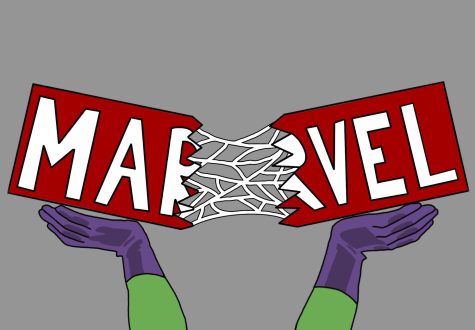The mighty have yet to fall
March 21, 2023

When “Iron Man” was released in 2008, no one could have predicted that the Marvel Cinematic Universe (MCU) would become what it is today. After that first film, 20 more movies would help build the MCU, all of them leading up to the release of “Avengers: Endgame” in 2019, which was one of the biggest releases of the decade and temporarily became the highest-grossing movie of all time. During the 11 years between the two movies, the franchise found a home in the hearts of millions of fans — from general audiences simply wanting to see the newest blockbuster to the most die-hard comic book connoisseurs.
Still riding off the high of “Endgame,” fans were eager to see if Marvel Studios’ future releases could be just as impressive. However, they could not witness much of the post-“Endgame” MCU because a year later, the world shut down due to the COVID-19 pandemic, which left audiences no longer feeling comfortable in movie theaters. Given that the studio was unable to release content during quarantine, they took advantage of the Disney Plus streaming service. They ventured into making content for television, which was the perfect distraction for an audience that was stuck inside their houses with the world on fire around them. To make up for the lack of content for over a year, once the studio noticed crowds starting to make their way back to theaters in the summer of 2021, Marvel put out “Black Widow,” their first theatrical release in two years, and they have been throwing everything they could on our screens ever since. Out of the seven TV shows, two TV specials and eight movies that Marvel has released post-quarantine, some of the content has landed extremely well with fans, but a lot of it has not, which raises a single question: why?
For about the past year, fans across the internet have been vocal about the fact that they think the MCU is falling off — losing its quality as well as the public’s interest — and the sound of this dissatisfaction reached its peak with the most recent Marvel release, “Ant-Man and the Wasp: Quantamania.” While the film was admittedly one of the MCU’s more lackluster productions, that does not mean the franchise is losing its spark. Audiences becoming less impressed with Marvel’s releases can be attributed to two main things, each at the fault of both the fans and the studio. Firstly, the fans are expecting too much following “Endgame” by wanting every story to be just as colossal. Secondly, Marvel was seemingly trying to put out everything they possibly could to make up for the pandemic, so much so that they began leaning toward quantity over quality.
“Endgame” was the culmination of over a decade of storytelling; it was an ending to the journeys of some of our favorite heroes. It was also a film that left both devoted fans and general audiences feigning for more. More than a movie, “Endgame” was an event, one that set a high bar — so high, that people have struggled to go into the films following it with realistic expectations. There have been several complaints about the MCU’s phase four, a slate of content beginning with “WandaVision” and ending with “Black Panther: Wakanda Forever,” most of which fall along the lines of there not being any appearances from other characters, that the new stories are boring and that they are not connected to the overarching MCU.
Realistically, a crossover event on a scale like “Endgame” takes years to develop, and since that has taken place, the MCU has to go back to square one. Looking back at phase one, the movies released from 2008 to 2012, they were introductory stories that familiarized general audiences with heroes they had likely never heard of before. Only in hindsight is it clear where those earlier movies were leading, that they were the building blocks that allowed for a story like “Endgame” to take place. So, it makes sense that most recent movies that Marvel has released have been fresher, smaller-scale stories with heroes that we are unfamiliar with. If fans are willing to ground their expectations in reality and absorb the new characters and unique stories that Marvel introduces us to, the journey leading up to the next large-scale crossover event will undoubtedly be more fun.
In this conversation of whether or not the MCU is falling off, the studio itself is not entirely absolved of blame and the reason is simple: they are putting out too much content. When Marvel puts out four movies and four TV series in seven months, it overcrowds the consumption pool and becomes too much for fans to keep up with. Even as a huge fan myself who kept up with all of this content as it came out, it was not without struggle. Not only that, Marvel’s rate of putting out content is reflected in the production quality of these releases. In several of the movies and series that the studio has released in the past few years, the CGI has been displeasing at times and the scripts can be messy in some areas, which are only a couple of examples that reflect the studio’s rush to get this content out to the masses. However, it seems as though Marvel is slowly beginning to make changes on this front.
For instance, they have postponed the film “The Marvels,” which was originally supposed to come out in July, only two months after “Guardians of the Galaxy Vol. 3,” to November. This is a sign that the studio is moving towards rectifying the content fatigue that they created over the past two years and is returning to putting out movies and TV shows at a rate that is easily digestible for fans. Also, spacing out their releases will allow the production workers plenty of time to produce content that is up to par, and will help the studio tip the scales in a way that favors quality over quantity and leaves fans satisfied.
In the past 15 years, the MCU has gained a tight hold on pop culture, but some fans think that its grip is beginning to loosen. This is largely due to personal dissatisfaction with some of the content the studio has put out lately, as well as low box office numbers, but it is too soon to tell whether a couple of underperforming movies will have a lasting effect on the franchise. In fact, it likely will not. The further the film industry moves from the pandemic, the less pressure there will be to make up for that lost time, and Marvel will rein back the amount of content they release. Also, fewer releases allow for more time to produce higher quality content, and it will be easier for fans to become attached to these new characters when their stories are done justice. In the end, Marvel is not so far gone that they cannot come back from this conversation of their content falling off, and if they make the necessary changes with their future releases, then it will allow for audiences’ enjoyment and admiration for the franchise to return.









